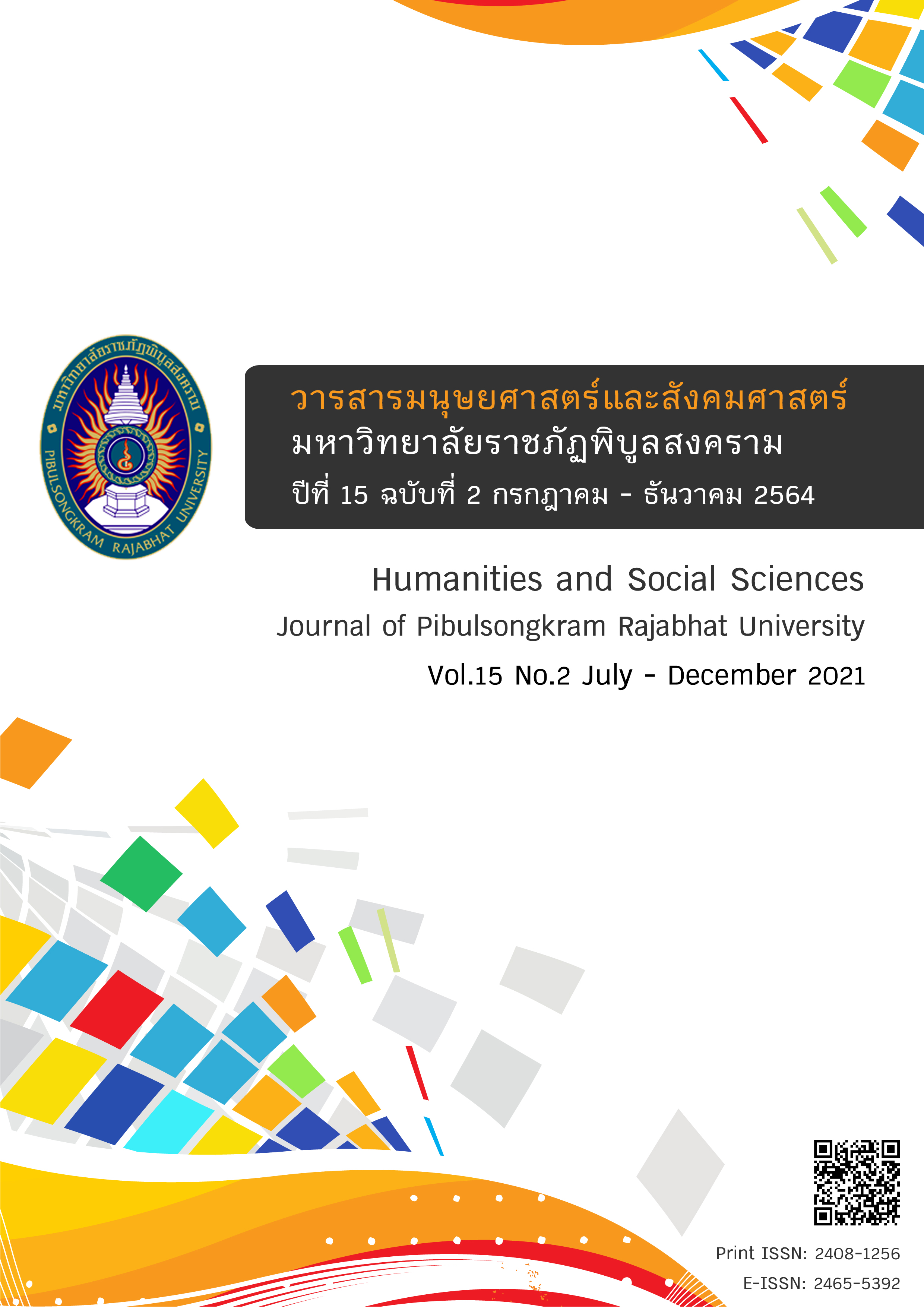Development of the Application Course on Social Studies Religion and Culture Subject on the Topic of Good Buddhist for Grade 2 Student in Watthaichumphon Municipality School
DOI:
https://doi.org/10.14456/psruhss.2021.34Keywords:
Application, Social Studies Religion and Culture Subject, Good BuddhistAbstract
The purposes of this research were to: 1) develop and find the quality of application on Social Studies Religion and Culture subject on the topic of Good Buddhist, 2) compare learning achievement in Social Studies Religion and Culture on the topic of Good Buddhist before and after learning by using application, and 3) study students’ satisfaction towards learning activities by using application. The sample consisted of 41 students Grade 2/2 during the academic year 2019 of Watthaichumphon Municipality School. The instruments of this research were: 1) application in Social Studies Religion and Culture on the topic of Good Buddhist, 2) the achievement test, and 3) questionnaires on satisfaction towards learning activities by using application The statistical analysis employed was mean, standard deviation, and t–test dependence. The results of this research were as follows: 1) develop quality of application in Social Studies Religion and Culture subject on the topic of Good buddhist had extremely high level in subject section ( = 4.77, S.D. = 0.19), had extremely high level in technical section (
= 4.81, S.D. = 0.25) 2) The learning achievement on Good Buddhist of Grade 2 students after learning by using application were statistically significant higher than before learning at .05 level. 3) The students’ satisfaction towards learning activities by using application on Good Buddhist one information were at a high level (
= 4.45, S.D. = 0.54) on the aspects of learning activities were at the extremely high, followed by forms of media.
References
กระทรวงศึกษาธิการ. (2551). หลักสูตรการศึกษาขั้นพื้นฐาน พุทธศักราช 2551. กรุงเทพฯ: โรงพิมพ์ชุมชนสหกรณ์การเกษตรแห่งประเทศไทย.
กระทรวงศึกษาธิการ. (2559). การพัฒนานักศึกษาสู่ Thailand 4.0. สืบค้น 5 ตุลาคม 2562, จาก https://www.moe.go.th./
เตือนฤดี รักใหม่. (2559). การออกแบบแอปพลิเคชันเพื่อการเรียนรู้ประวัติศาสตร์ศิลป์สำหรับนักศึกษาระดับปริญญาตรี. วารสารวิชาการคณะสถาปัตยกรรมศาสตร์ สถาบันเทคโนโลยีพระจอมเกล้าเจ้าคุณทหารลาดกระบัง, 23(2), 119-131.
นภัสกรณ์ ทรัพย์รุ่งเรือง, และปริญญา พรอนันต์. (2559). เทคโนโลยีการเรียนรู้แบบเคลื่อนที่ แอปพลิเคชันเพื่อการศึกษา. สืบค้น 19 พฤษภาคม 2562, จาก https://prezi.com/ybcvbe8y6f27/mobile-learning-application-for-ed/
ปิยนันท์ ปานนิ่ม. (2559). การพัฒนาแอปพลิเคชันเพื่อการเรียนรู้บนระบบปฏิบัติการแอนดรอยด์ เรื่องพยัญชนะและสระไทย สำหรับเด็กที่มีความบกพร่องทางการเรียนรู้. วารสารวิชาการมหาวิทยาลัยอีสเทิร์นเอเชียฉบับวิทยาศาสตร์และเทคโนโลยี, 10(3), 246-254.
พรทิพย์ วงศ์ศิลป์อุดม, และศิวนิต อรรถวุฒิกุล. (2559). การพัฒนาแอปพลิเคชันบทเรียนบนคอมพิวเตอร์พกพา ร่วมกับการเรียนแบบเพื่อนช่วยเพื่อนที่ส่งผลต่อการเรียนรู้ร่วมกันของนักเรียนระดับชั้นประถมศึกษาปีที่ 3 จังหวัดเพชรบุรี. วารสารฉบับภาษาไทย สาขามนุษยศาสตร์ สังคมศาสตร์ และศิลปะ, 9(3), 588-599.
วัชรพล วิบูลยศริน. (2557). หลักการออกแบบการเรียนการสอนบนเว็บตามแบบจำลอง ADDIE เพื่อการสอนสนทนาภาษาไทยเบื้องต้นสำหรับชาวต่างประเทศ. วารสารศรีนครินทรวิโรฒวิจัยและพัฒนา, 6(12), 192-205.
วิลัยพร ไชยสิทธิ์. (2555). การพัฒนาแอปพลิเคชันฝึกทักษะทางคณิตศาสตร์บนเครื่องคอมพิวเตอร์แท็บเล็ตสำหรับนักเรียนระดับชั้นประถมศึกษาปีที่ 1. วารสารศรีปทุมปริทัศน์ ฉบับวิทยาศาสตร์และเทคโนโลยี, 4(1), 143-151.
สุปรียา เดชรักษา, และทิพวิมล ชมพูคำ. (2560). การพัฒนาแอปพลิเคชันบัญชีรายรับ-รายจ่าย บนระบบปฏิบัติการแอนดรอยด์. วารสารโครงงานวิทยาการคอมพิวเตอร์และเทคโนโลยีสารสนเทศ, 3(1), 1-7.
Kurniasari, P., & Mardikaningsih, A. (2019). E-Mindmaps Application Development in Materials of Social and Basic Culture Using Android-Based Groupware. In International Conference on Social Studies and Environmental Issues (ICOSSEI 2019) 18 February 2020. Advances in Social Science, Education and Humanities Research (Atlantis Press), 404, 242-245.
Downloads
Published
How to Cite
Issue
Section
License
Any articles or comments appearing in the Journal of Humanities and Social Sciences, Rajabhat Phibulsongkram University, are the intellectual property of the authors, and do not necessarily reflect the views of the editorial board. Published articles are copyrighted by the Journal of Humanities and Social Sciences, Rajabhat Phibulsongkram University.









